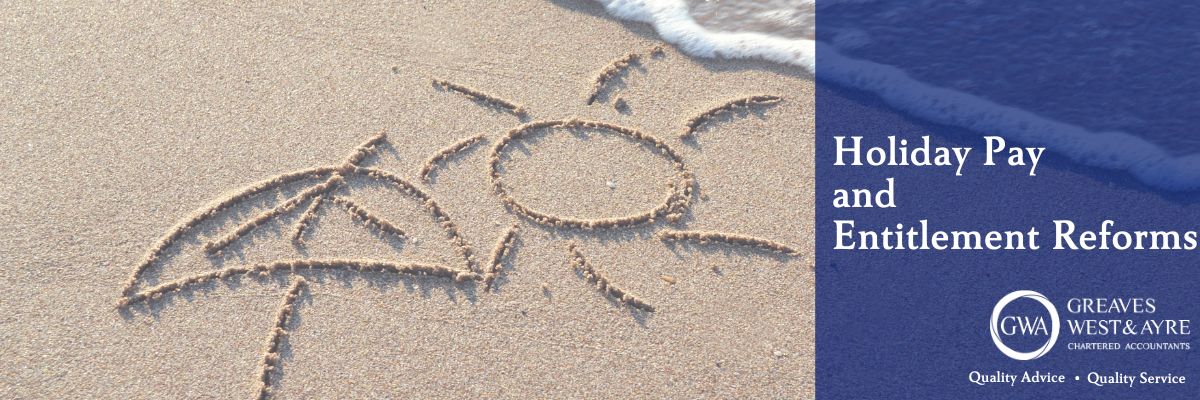Holiday pay and entitlement reforms

On the 1 January 2024 the Department for Business and Trade (DBT) issued guidance on the changes that are being made to the Working Time Regulations. But what does it mean, and how will it affect people’s payroll?
The idea is to simplify holiday entitlement and the holiday pay calculations for any irregular hours that people work or accrue, this also applies to part-year workers.
Previously payroll professionals have relied on case law to work out the relevant payments that needed to be added as normal pay, but now they can rely on legislation that defines “normal remuneration”. We outline these definitions below:
· payments that are linked to performance, such as commission
· payments that relate to a professional or personal status, such as professional qualifications
· regular payments that have been paid in the last 52 weeks, such as overtime
The new rules will come into effect for leave years that began on or after 1 April 2024. If the leave year started on 1 January 2024, they will apply from January 2025.
Irregular hours and part-year workers definitions
The regulations have been set out and new definitions have been created to clarify how holiday entitlement should be calculated and any pay for irregular hours and part- year workers. This will allow employers to correctly identify the workers and process pay compliantly.
Irregular hours worker
Employees contracted hours are mostly variable, this includes those on zero contract or causal hours.
Part-year worker
If an employee is only contracted to work part of the year, which results in a period of at least 1 week that they are not required to work and will not be paid.
An example is a seasonal worker who picks fruit in the spring/summer, however, they are not contracted or paid to work in the Autumn/Winter.
There are certain situations to be mindful of, such as teachers and teaching assistants, who are only required to work 38 weeks of each year due to school holidays. If they only receive pay for the weeks the school is open then they are classed as part-year workers. If their annual salary is paid over a 12-month period they cannot be classed as part year workers.
Holiday entitlement for irregular hours and part-year workers
The methods for administering leave below can only be used for anyone who has been identified as an irregular or part-year worker.
For leave years that started before 1 April 2024 the holiday entitlement will be calculated in the same way.
For any leave years that started on or after 1 April 2024 employers can chose to accrue their holiday entitlement as a bank of leave to take as holiday pay rolled up.
Irregular or part-year workers who receive 5.6 weeks (a maximum of 28 days) statutory holiday entitlement will be calculated at 12.07% of the actual hours worked in a pay period.
For employers that offer more than the statutory minimum annual leave of 5.6 weeks, they must amend the accrual percentage. For example six weeks of leave would result in the rate of accrual being 13.04%.
Accruing a bank of holiday hours
If leave is accrued in a bank, then you should work out 12.07% of the hours paid in each pay period.
Hours can be rounded down to zero if they are under 30 minutes, however, they will be rounded up to one hour if they are more than 30 minutes. If this method is used then employees will need to request the hours as time off. Leave is then paid when it is taken, using the normal 52-week average to work out the week’s normal remuneration.
Rolled-up holiday pay
There is an option called rolled-up holiday pay. This works on the basis that the employee will be paid for their holiday entitlement as and when it is accrued in a pay period, rather than when it is taken.
Rolled-up holiday pay was previously deemed unlawful under the working time directive. However, the amendments to the legislation have now made rolled-up holiday pay lawful for irregular and part-year workers only.
We have shown an example of how to work out the value of rolled-up holiday pay, for a worker’s total pay in a period below.
The workers total pay in a period should be multiplied by the statutory entitlement for 12.07%. That entitlement must be paid each pay period, and it must also be shown as a separate line on the payslip and it must identify what that payment is for.
Below is an example of a worker who is paid each month and who has worked 134 hours at an hourly rate of £11.44.
134 x £11.44 = £1,532.96 is the total pay in the pay period
£1,532.96 x 12.07% = £185.03 is the holiday pay that is due in that period.
Accrual whilst on statutory leave
If employees are off sick, on family leave, maternity, paternity, or adoption leave, holiday entitlement will still be accrued. If employers accrue leave in a bank, a 52-reference period will be used to work out the average amount of hours worked. Any weeks that contain statutory leave should be excluded, however, weeks where no work or pay was due are included. For the weeks that cannot be included, an extra week should be added until a total 52-week period is reached, employers can only look back 104 weeks to gather the data. If there are less than 52 weeks’ worth of hours, then it should be divided by the number of valid weeks.
If rolled up holiday is used, that can be taken as an average of the holiday pay elements paid in that period, which can include and exclude weeks on the same theory as outlined above.


